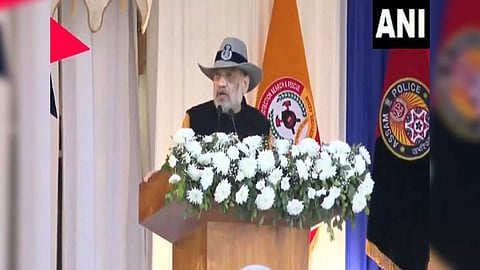

GUWAHATI: Union Home Minister Amit Shah on Saturday said that the Indo-Myanmar border will be fenced like the Indo-Bangladesh border to curb the influx of illegal migrants and insurgents.
Addressing the passing out parade ceremony of Assam Police Commandos, Shah said, " Indo-Myanmar border is to be fenced like the Indo-Bangladesh border. The Centre, under the leadership of Prime Minister Narendra Modi, has decided to fence the Indo-Myanmar border to curb the influx of illegal migrants and insurgents."
"We are also thinking of ending the free-movement facility with Myanmar," Shah added. Shah applauded the Assam Police for fighting against different issues including infiltration and drug smuggling. "Assam has always been affected by infiltration issues that have been going on for 10 decades, Bangladesh Liberation War of 1971, drug smuggling, etc., but Assam Police has a glorious history of fighting and winning against these issues," he said. The Union Minister also launched a scathing attack on the Congress's Bharat Jodo Nyay Yatra and said that people who lost their family members due to insurgency in Congress rule are opposing the yatra.
"Rahul Gandhi has launched Bharat Jodo Nyay Yatra recently, I asked a few media personnel here today, what happened in Assam. During Congress rule, thousands of youths lost their lives, extremism prevailed in Assam. The family members of those people who lost lives during Congress rule objected to Congress Yatra and demanded justice," Shah said. Meanwhile, the 1,643-km-long India-Myanmar border, spanning Mizoram, Manipur, Nagaland, and Arunachal Pradesh, currently operates under the Free Movement Regime (FMR), permits individuals living near the India-Myanmar border to travel 16 km into each other's territories without a visa.
Initiated in 2018, the FMR policy was a component of India's Act East policy. As per FMR policy, those belonging to the hill tribes, being citizens of either India or Myanmar and residing within a 16 km radius on either side of the border, can cross with a border pass valid for one year, allowing a stay of up to two weeks per visit. Allegations claim that following the military coup in Myanmar on February 1, 2021, a considerable number of Myanmar's tribal population crossed into India, particularly Manipur and Mizoram, and remained illegally.
It's alleged that these individuals sought refuge on Indian territory and subsequently engaged in unlawful activities, notably drug smuggling. In September 2023, Manipur Chief Minister N Biren Singh appealed to the Centre to terminate the FMR. The state government contends that insurgents exploit this regime to advance their activities.
Manipur shares approximately 390 km of a porous border with Myanmar, with only about 10 km fenced as of now. In July last year, the state government disclosed data indicating that approximately 700 illegal immigrants had entered the state. Additionally, following the military coup in Myanmar on February 1, 2021, Mizoram has witnessed an influx of thousands of anti-Junta rebels. Government estimates suggest that several thousand refugees have settled in various parts of Mizoram since the coup.
Mizoram has a porous border spanning 510 kilometres with Myanmar. The Manipur Chief Minister mentioned incidents where individuals from Myanmar attempted to enter his state but retreated upon encountering a substantial presence of security personnel. Manipur shares a 398-kilometer border with Myanmar.
Arunachal Pradesh shares a 520-kilometer border with Myanmar, whereas Nagaland's border with the country spans 215 kilometres.